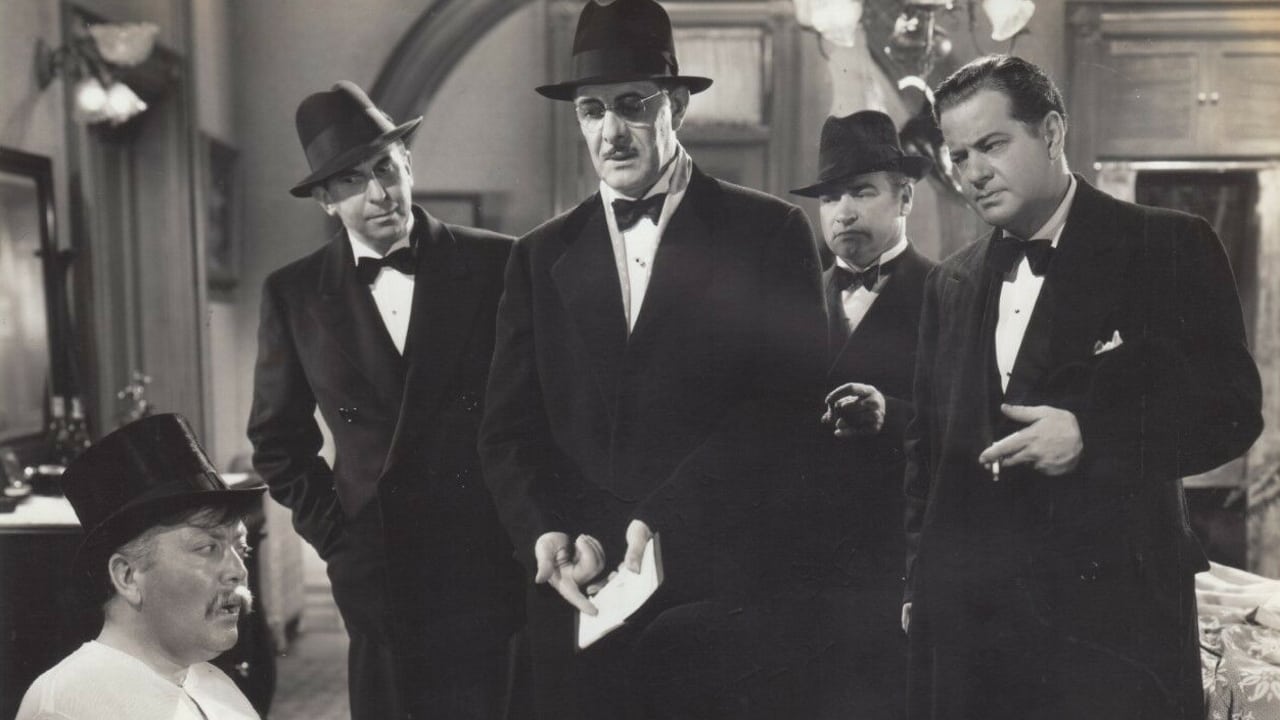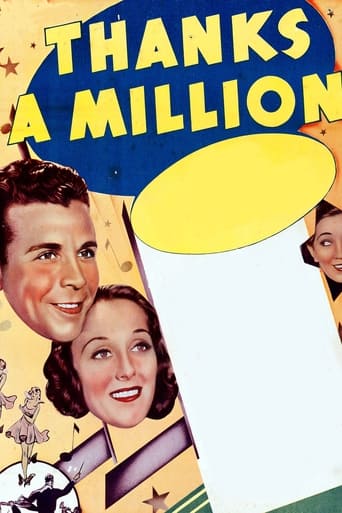

Instead, you get a movie that's enjoyable enough, but leaves you feeling like it could have been much, much more.
... View Moreif their story seems completely bonkers, almost like a feverish work of fiction, you ain't heard nothing yet.
... View MoreThis film is so real. It treats its characters with so much care and sensitivity.
... View MoreIt is a whirlwind of delight --- attractive actors, stunning couture, spectacular sets and outrageous parties.
... View MoreAlthough the golden days of radio were long before I was born, I've always enjoyed the great radio comedians and was thrilled to see this Fred Allen movie being shown around the time of the 2008 election.Fred Allen, who passed away in the early 1950s, was a contemporary of George Burns, Bob Hope, and Jack Benny, who pioneered the format of the sitcom in radio and later onto television. Unfortunately, Mr. Allen did not live long enough to make it into television (and he admittedly had a "face for radio", as he put it).It is AMAZING to see how much the political parody in the movie Thanks a Million still hits the mark; the song "Square Deal Party" is a gem. If you get the chance to see this movie, don't miss it (I would recommend taping it - if you enjoy political satire, you will probably want to hear the lyrics of "Square Deal Party" again). It should be shown by the classic movie channels again WELL BEFORE 2012!!!Fred Allen has an enjoyably sardonic, self aware delivery in this movie; it can be argued that his political satire on the radio was the first America had within that genre, if not some of the finest at that time. The Looney Tunes character Foghorn Leghorn (think the big rooster with the southern accent) is obviously based on the character Senator Claghorn from his "Allen's Allen." Fred Allen was a wordsmith who coined the phrase "low man on the totem pole" and is seriously underrated, in my opinion. Anyone who has an interest in American comedy/political satire and is not yet familiar with Fred Allen should spend a little time reading up on him and learning about a great American comedian who is sadly neglected and unknown today.
... View MoreAfter becoming Warner Brothers big musical star in the Thirties, Darryl Zanuck who had formerly been chief of production at Warner Brothers before going to 20th Century, got Jack Warner to loan him Dick Powell for two films. The second was On the Avenue which may have been his best film in the decade and this one, Thanks a Million which is almost as good. Powell desperately wanted to broaden his range, but the only thing Jack Warner gave him that could be classified as broadening was A Midsummer Night's Dream and that was a bit too broad. While both Thanks a Million and On the Avenue were not heavy drama, the writing was considerably above what Powell was given at Warner Brothers.I happened to have some old vinyl albums which contained Dick Powell's recordings of the songs he sang from this film even though I had never seen it until recently. I liked the score that Arthur Johnston and Gus Kahn wrote, very much and it was what prompted me to get a bootleg tape of Thanks a Million. I'm glad I did.It's one of the best political satires, I've ever seen done. Powell is a singer with a troupe traveling by bus to New York when it inevitably breaks down. To sing for their supper they join forces with political candidate Raymond Walburn to provide entertainment at his rallies. Soon they take over and one night when Walburn gets to drunk to go on, Powell gives a synopsis of his speech. Then political bosses Alan Dinehart and Paul Harvey get the bright idea to substitute Powell as their puppet candidate.Elect a singing governor, nonsense you say. I would hasten to remind you that in that same era, Jimmie Davis was elected governor of Louisiana, Wilbert Lee O'Daniel was elected governor of Texas, and Glen H. Taylor became Senator from Idaho on the strength of their radio entertainment. Not as far fetched as you think. And very shortly Powell's home studio would be signing a mid-west sports announcer to an acting contract who would one day be president of the United States.Powell gets able support from Ann Dvorak and Patsy Kelly as a singing sister duo, concert violinist David Rubinoff, radio's Fred Allen in the kind of role William Demarest later did for Preston Sturges. But acting honors go to Raymond Walburn. Walburn had playing these bloviating jovial type politicians down to a science, but he was never better than in this film as the tipsy fatuous judge the political bosses nominate as a puppet. He steals every scene he's in and the film should be preserved for him alone as well as one of Dick Powell's best musicals.The songs Powell sings in this film Thanks a Million, I'm Sitting High On a Hilltop, and I've Got a Pocketful of Sunshine are very good. The last two were the philosophical type numbers that normally one would associate with Bing Crosby. In fact next year Arthur Johnston the composer part of the team would be writing for Crosby, they'd be doing Pennies from Heaven over at Columbia.You made a million dreams come true and so I'm saying thanks a million to you, Dick Powell.
... View MoreTHANKS A MILLION (20th Century-Fox, 1935), directed by Roy Del Ruth, ranks one of the finer musical-comedies released during the initial years of the newly formed 20th Century-Fox studio. Although reportedly successful, it's so overlooked these days as musicals are concerned that after viewing it, one wonders why it isn't better known. It comes near to something of a political satire from the Preston Sturges (THE GREAT McGINTY, 1940) school for comedy, or Frank Capra's (MR. SMITH GOES TO WASHINGTON, 1939) common man making good philosophy. Starring Dick Powell and Ann Dvorak, both on loan-out assignments from Warner Brothers, the feature film debut of radio comedian Fred Allen, musical antics by the Yacht Club Boys, along with delightful wisecracking Patsy Kelly, notable faces of Alan Dinehart, Paul Harvey, Edwin Maxwell, Russell Hicks and Andrew Toombes, character actor Raymond Walburn in a memorable performance, and special guest appearance of Paul Whiteman and his Band, THANKS A MILLION should get enough votes to be declared a winner.The story opens on a rainy night where Ned Lyman (Fred Allen) and his musical troupe riding on a bus bound for New York City. Departing a bus in New City, Pa., only to have to wait two hours for the next bus to their destination, the troupe decide to escape the rain by entering a building where a political rally is taking place. Campaigning for governor is Judge A. Darius Culliman (Raymond Walburn), making his long-winded speech that puts his attendees to sleep, although many are there only to wait until the rain stops. Noticing a disaster, Lyman suggests to the candidates that the only way for Culliman to get a full house is to try a new approach in hiring his troupe entertain with songs and dancing in between speeches, with Eric Land (Dick Powell) acting as crooner, and Sally and Phoebe Mason (Ann Dvorak and Patsy Kelly) performing as dancers. The idea practically works until one night Culliman arrives drunk, leaving Eric to fill in and campaign for Culliman.Eric's trusting and pleasing personality has the public wanting Culliman to withdrawn his ticket and have Eric run for governor instead. At first he refuses, but Eric does it anyhow, but for the wrong reasons, thus, causing him to lose the love and trust of his girlfriend, Sally, especially after spending more time with Betsy Kruger (Margaret Irving), his campaign manager's (Alan Dinehart) wife, who wants Eric for herself.On the musical program, with music and lyrics by Arthur Johnston and Gus Kahn, songs include: "Thanks a Million" (instrumental, violin played by David Rubinoff); "Sugar Plum" (danced by Ann Dvorak and Patsy Kelly); "I've Got a Pocketful of Sunshine" (sung by Dick Powell); "Square Deal party" (written and performed by The Yacht Club Boys); "Thanks a Million" (sung by Powell and Dvorak); *"A Fella Has to Learn His A.B.C's Today" (written and performed by The Yacht Club Boys); "Sugar Plum" (sung by Dvorak and Kelly); "Sittin' High on a Hill Top" (sung by Powell); "The Belle of New O'Leans" (sung by Ramona playing piano); "Happy Days Are Here Again" (instrumental); "Thanks a Million" (sung by Powell); and "Square Deal Party" (reprise/sung by cast). Good tunes with optimistic titles quite popular during the Depression era, most largely forgotten today.*A Fella Has to Learn His A.B.C.'s Today" is a comic number deleted from the final print that exists on a motion picture soundtrack album (double featured with HAPPY GO LUCKY, a 1942 Dick Powell musical) as distributed by Caliban Records in 1981.Singing dominates dancing in this production, with Dick Powell keeping himself busy in his sixth 1935 theatrical film release, putting his vocal chords to good use. A likable box office attraction, it's no wonder why anyone wouldn't want to vote for him. In 1937, Powell was invited back to 20th Century-Fox for another successful musical, ON THE AVENUE, featuring Madeleine Carroll and Alice Faye, with score by Irving Berlin.Summed up best as an Election Day movie, THANKS A MILLION was remade by 20th-Fox as IF I'M LUCKY (1946) starring Carmen Miranda, Perry Como, Vivian Blaine and Phil Silvers. Both musicals, currently presented on the Fox Movie Channel, were formerly shown on the American Movie Classics cable channel from 1991-92. (***1/2)
... View MoreIf you can accept the premise: that an out-of-work crooner can be nominated for governor of a state on the basis of a single speech, there are some attractive moments in this film. Dick Powell moves beyond his ingenuous Warner Brothers musical style, and seems on his way to becoming the actor he later showed himself to be. Fred Allen replicates his sharp-tongued radio persona, and is able to provide most of the humor, even though he clearly did not have a charismatic screen presence even as real as that of Jack Benny or Eddie Cantor. The satirical treatment of small-state politics is rather heavy-handed, suggesting that there is nothing but self-interest involved. The songs are nothing special, but Powell delivers them in his usual off-hand yet convincing manner. For me, the most interesting and surprising episodes in the film were the two song and dance numbers by Ann Dvorak and Patsy Kelly. Having known Dvorak only as a performer in melodrama, from Scarface to Rebel Without a Cause, I looked closely, to see whether there was a double; but there were enough close-up shots to let one see that her dancing wasn't faked.(Whether the singing was dubbed is another matter). She was always an actress whose work I found compelling, though she never achieved top stardom at Warners; perhaps because Bette Davis was slated for some roles Dvorak might have played. Probably not a "gem", but a film many will enjoy.
... View More